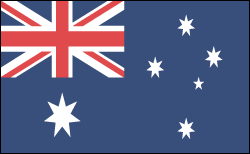Australia
- Sovereign: Queen Elizabeth II (1952)
- Governor-General: Quentin Bryce (2008)
- Prime Minister: Julia Gillard (2010)
- Land area: 2,941,283 sq mi (7,617,931 sq km); total area: 2,967,893 sq mi (7,686,850 sq km)
- Population (2012 est.): 21,015,576 (growth rate: 1.13%); birth rate: 12.28/1000; infant mortality rate: 4.55/1000; life expectancy: 81.9
- Capital (2009 est.): Canberra, 384,000
- Largest cities: Sydney 4.429 million; Melbourne 3.853 million; Brisbane 1.97 million; Perth 1.599 million (2009)
- Monetary unit: Australian dollar

The first inhabitants of Australia were the Aborigines, who migrated there at least 40,000 years ago from Southeast Asia. There may have been between a half million to a full million Aborigines at the time of European settlement; today about 350,000 live in Australia.
Dutch, Portuguese, and Spanish ships sighted Australia in
the 17th century; the Dutch landed at the Gulf of Carpentaria in 1606. In 1616
the territory became known as New Holland. The British arrived in 1688, but it
was not until Captain James Cook's voyage in 1770 that Great Britain claimed
possession of the vast island, calling it New South Wales. A British penal
colony was set up at Port Jackson (what is now Sydney) in 1788, and about
161,000 transported English convicts were settled there until the system was
suspended in 1839.
Free settlers and former prisoners established six colonies:
New South Wales (1786), Tasmania (then Van Diemen's Land) (1825), Western
Australia (1829), South Australia (1834), Victoria (1851), and Queensland
(1859). Various gold rushes attracted settlers, as did the mining of other
minerals. Sheep farming and grain soon grew into important economic
enterprises. The six colonies became states and in 1901 federated into the
Commonwealth of Australia with a constitution that incorporated British
parliamentary and U.S. federal traditions. Australia became known for its
liberal legislation: free compulsory education, protected trade unionism with
industrial conciliation and arbitration, the secret ballot, women's suffrage,
maternity allowances, and sickness and old-age pensions.
From the World Wars to the End of the Millennium
Australia fought alongside Britain in World War I, notably
with the Australia and New Zealand Army Corps (ANZAC) in the Dardanelles
campaign (1915). Participation in World War II helped Australia forge closer
ties to the United States. Parliamentary power in the second half of the 20th
century shifted between three political parties: the Australian Labour Party,
the Liberal Party, and the National Party. Australia relaxed its discriminatory
immigration laws in the 1960s and 1970s, which favored Northern Europeans.
Thereafter, about 40% of its immigrants came from Asia, diversifying a
population that was predominantly of English and Irish heritage. An Aboriginal
movement that grew in the 1960s gained full citizenship and improved education
for the country's poorest socioeconomic group.
In March 1996, the opposition Liberal Party–National Party
coalition easily won the national elections, removing the Labour Party after 13
years in power. Pressure from the new, conservative One Nation Party threatened
to reduce the gains made by Aborigines and to limit immigration.
In Sept. 1999, Australia led the international peacekeeping
force sent to restore order in East Timor after pro-Indonesian militias began
massacring civilians to thwart East Timor's referendum on independence.
Australia Elects Its First Female Prime Minister
Rudd's popularity plummeted in May 2010, largely because he
shelved his environmental policy that centered on an emissions-trading system.
In June, the Labor Party ousted him as its leader and elected his deputy, Julia
Gillard. She became Australia's first female prime minister in June and
promptly called for elections, which were held in August. They resulted in a
hung parliament, with neither the incumbent Labor Party nor the conservative
Liberal-National coalition, led by Tony Abbott, taking a majority of seats. It
is the country's first hung parliament in 70 years. After several weeks of
attempting to woo members of parliament to her side, Gillard succeeded in early
September, when two independents backed her. It was enough to give her the
slimmest majority: 76 out of 150 seats.
Worst Flooding in Decades
In Jan. 2011, the worst flooding for decades in Queensland
cut off many cities and towns. The floods left more than 30 people dead and
caused billions of dollars in damage to mines, farms, and cities. Coal mining
operations in the Australian state were severely hampered. The flood affected
about 200,000 people and covered an area larger than France and Germany
combined. Prime Minister Gillard started off the New Year by visiting the
ravaged state. In April, Queensland urban areas were plagued with extremely
large numbers of flying beetles, a likely result of the floods.
U.S. Establishes Military Presence
Nov. 2011 saw Barack Obama in Canberra where he announced a
new American military presence near the port city of Darwin, "Australia's
Pearl Harbor." Marines will be gradually deployed over the coming years,
to a total strength of 2,500. Mr. Obama's speech established his commitment to
"a larger and long-term role" in shaping the region, which will
include providing humanitarian relief and responding to security issues in
Southeast Asia and the South China Sea.
Comments
Post a Comment